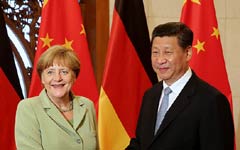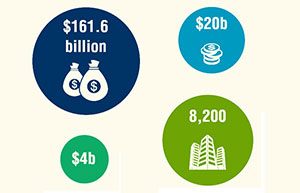Global investors hunger for dim sum bonds
(Xinhua) Updated: 2014-07-08 14:50"Pricing now more accurately reflects the credit risks," Chung said. "As more credit ratings make the market more transparent, fixed-income institutional investors, rather than currency speculators, are buying offshore yuan bonds."
"It forces people to be more thoughtful about what they are buying. They need to be more savvy, and can't simply expect currency appreciation to bail them out of a bad credit decision," said Jake Gearhart, Head of the Global Risk Syndicate, Asia at Deutsche Bank.
The falling yuan has done little to deter investors from buying dim sum bonds, mostly because they believe China's central bank has got the situation under control.
|
 |
 |
Global footprints
With renminbi clearing banks now in London and Frankfurt, European investors have been inspired to fatten up their yuan holdings.
While Hong Kong will remain the primary offshore yuan market, Europe is likely to be second, according to Deutsche Bank.
"Many institutions think that they are not complete without renminbi business," Chung said.
Lion City bonds and Goethe bonds, both offshore yuan bonds, have come out of Singapore and Frankfurt, respectively.
"From an access perspective, and for ease of investment, the dim sum market still stands out as one of the most attractive for an ability to buy corporate credit," Gearhart said.
The dim sum bond market is still not scalable enough for the bigger asset managers to allocate funds to it.
Total outstanding dim sum bonds stood at $55.5 billion in 2013 by Fitch's estimates, only 3.7 percent of domestic yuan bonds with outstanding of $1.5 trillion equivalent.
But with China likely to overtake the US as the world's biggest corporate debt issuer, the market expects a spill-over to offshore borrowing.
"Whether you are bullish or bearish, you have to start focusing on it as the potential remains enormous," Gearhart said.
 |
 |
| Top 10 most attractive FDI destinations in the world | Top 10 investors to the Chinese mainland |
- Experts urge lending innovation for small firms
- China stocks close higher Tuesday
- Brain-controlled car developed by Nankai University
- Taxes on 'dumped' US chicken increased
- China, ROK accelerate FTA talks
- Global investors hunger for dim sum bonds
- Property developer uses helicopters and models for promotion
- China GDP to hit 6.6% next year: Credit Suisse

















